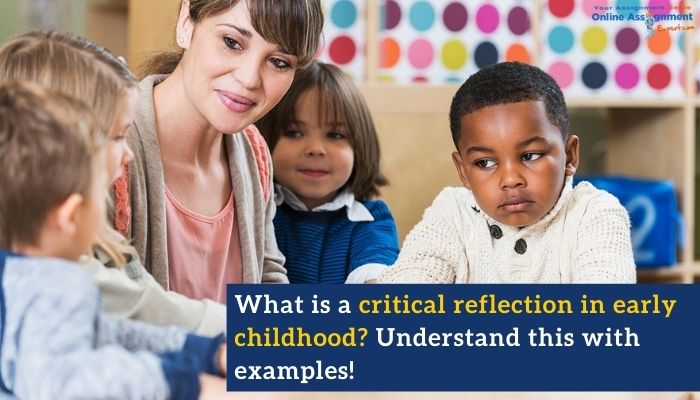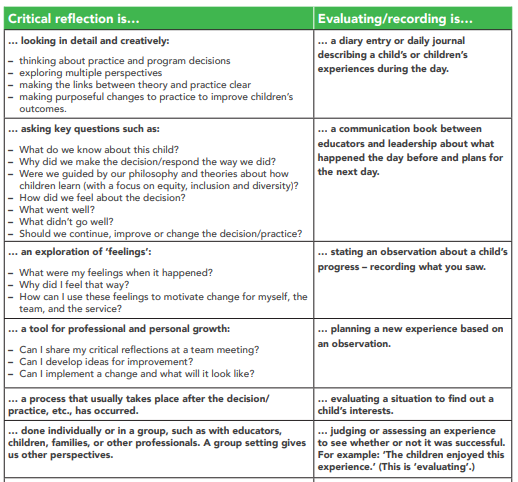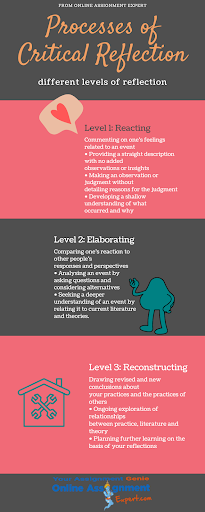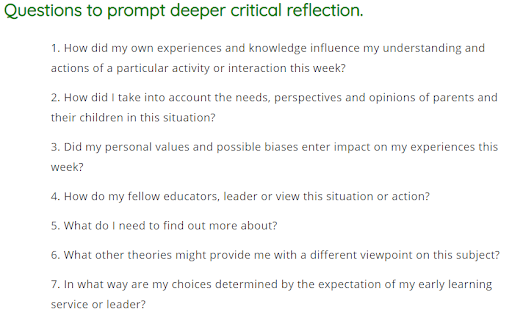
In the field of care and education services, critical reflection is meant to “closely examine the aspects of a particular event and/or experiences from a different point of view.” When you are asked to write critical reflection assignments in early childhood, then you must have an understanding of “how it is different from the examination, assessing, summarising, and recording what an instructor is doing or seeing. For example –

Suppose you are a student and willing to write a critical reflection on your early childhood assignments. In that case, you must know the meaning and existing processes being followed in support of learning and quality improvement. However, few reflection areas should be discussed, which are likely to cause discussions and arguments within the team members and how they can be used as learning opportunities. Our experts providing early childhood assignment help in Australia have discussed some tips and reflections followed when we discern children, examine their learning, and determine how we identify education's importance.
When it comes to critical reflection in early childhood, it is all about providing an outline to think inversely about working over and done with distinct obstacles and issues. It would also help if you were required to assist educators in making meaningful changes in practice so that the children’s outcomes can be improved.

The experts providing help in critical reflection in early childhood assignments say that critical reflection is a type of personal development and learning which encompasses thinking about the procedures and policies with honesty and intent. It is generally entrenched into daily practice. Thus it might need challenging skills to question and make changes in the existing rules and assumptions.
However, critical reflection is involved with –
More details about critical reflection can be collected from the experts engaged in early childhood assignment help services. These experts have ample knowledge and understanding to deal with the university’s assignments. However, further details like the importance of critical reflection, essential elements concerned with critical reflection, and others are discussed below.
Early childhood education's critical reflective practice is to make sure that the most satisfactory results for children in examples of reflective practice in early childhood education. As we understood above, critical reflection is essential for the educator in many ways – as it assists in the active learning experience, reflecting on their biases, etc. Few benefits for critical reflection include:
According to early childhood assignments, critical reflection offers a suitable structure to think creatively and effectively in different situations and helps educators propose meaningful changes.

To effectively apply critical reflection in your practice, you must undergo the following steps as per the EYLF reflection guide. Few important details are discussed below: Children have an incredible identity sense
Children contribute to their world
Children develop a sense of wellbeing
Children have involved learners and confidence
These were the steps that can be followed to use critical reflection in practices. There could be several other methods for this. To know about them, contact early childhood assignment help experts. You can also refer to critical reflection in early childhood examples written by childcare assignment experts.
In the field of early childhood, reflective culture is quite important. It helps educators, willy-nilly of their experience and qualification, to keep them affianced in critical reflective practices. However, there are few elements to be taken care of in developing a reflective culture. They are –
These were the critical information you should know about before writing the critical reflection assignment for early childhood. In case if you need any sort of help regarding this childcare to feel free to contact us. We are offering round-the-clock customer support to university scholars. Few highlights of our services are –
+FREE
Few amazing professional services
Additional perks and benefits
At Online Assignment Expert, we are a world-known assignment help service provider who has been providing academic assistance since 2010. Our team of experts is excellent in designing critical reflection in early childhood assignments. They follow the university guidelines and maintain academic integrity throughout the paper.
Therefore, hiring them for your tasks guarantee on-time delivery of the project, a well-researched assignment paper, follows adequate marking rubric, and maintain confidentiality with best assignment help.
Get
500 Words Free
on your assignment today